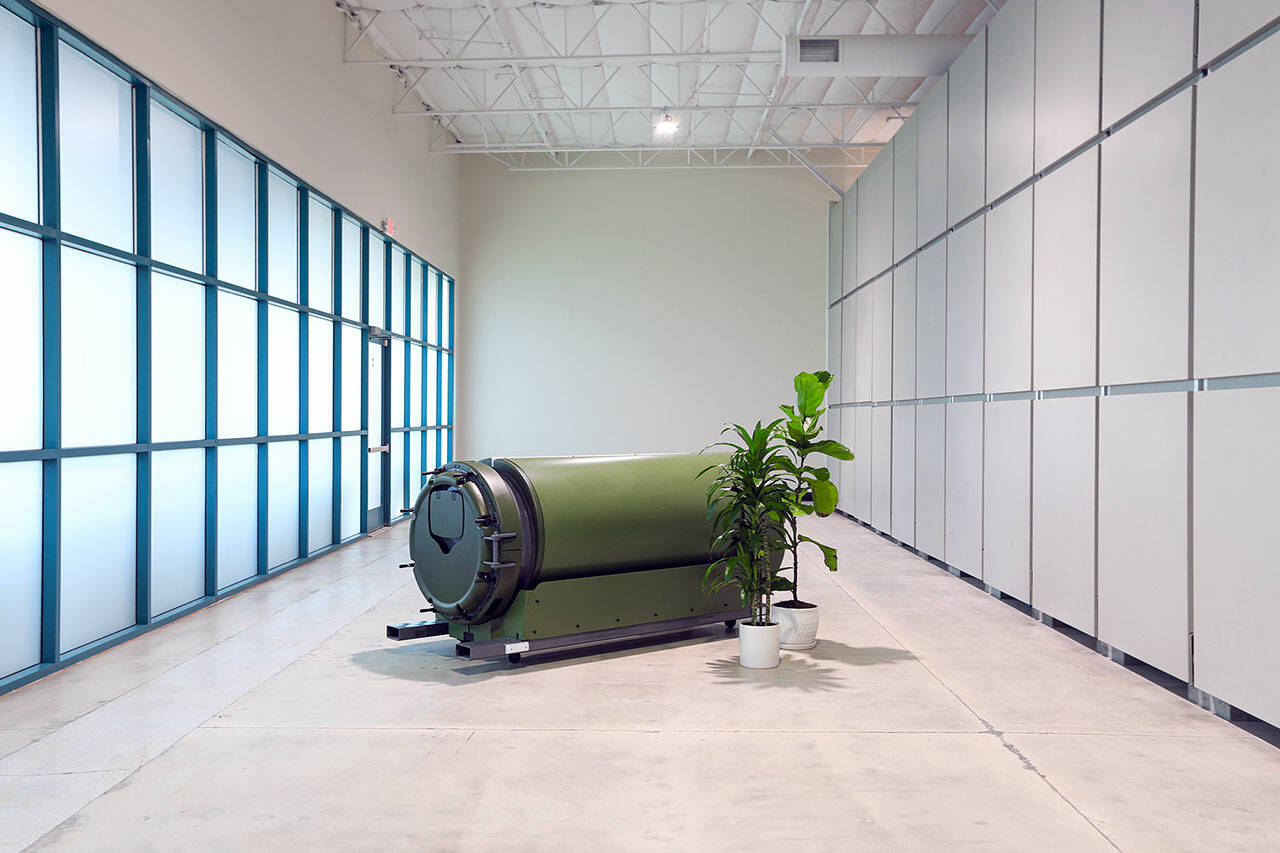QUILCENE — Auburn-based human composting company Earth Funeral is seeking to make a third option available, as an alternative to cremation or traditional burial.
“Human composting, otherwise known as natural organic reduction (its legislative term), or terramation is the process of gently transforming a body into soil,” said Haley Morris, a spokesperson for Earth Funeral. “It is the most environmentally conscious deathcare option and it is a safe and gentle alternative to cremation and to traditional burial.
“For people who choose natural organic reduction or human composting, they really like the idea of returning to nature, and of their final act doing something that is good for the earth, good for the environment and good for future generations.”
Earth Funeral owns a 5-acre piece of old logging land in Quilcene, said Morris. The company is using the land for restoration and conservation efforts supported by soil coming from the terramation process.
Morris said that the 5-acre property was purchased by the company in 2022.
They are working on restoring coniferous trees and supporting emergent wetlands on the site, with the help of forest ecologist Lyndon Lee, she added.
The company hosted their first open house on the property last weekend, allowing family members to visit the land and see how the soil generated from the terramation process is being used on the property.
“Families got to come and see the conservation efforts that had been underway, using their loved ones’ soil,” said Morris. “And also, if they had any kind of ceremony or way that they wanted to honor their loved one, they were welcome.”
The company plans to hold more open houses in the future, said Morris.
The process takes place in a proprietary vessel, Morris explained, which accelerates natural processes that might otherwise occur over years. Morris said that the process can take from 30 to 45 days.
Terramation involves placing a body into a vessel with organic materials such as mulch, wood chips and wildflowers, according to a description on the Earth Funeral website. The vessel is sealed and the process is carefully monitored for a balance of carbon, nitrogen and moisture, which facilitates microbial activity, breaking the body down into soil.
Sometimes bones are removed, ground down and returned, the description continues. Inorganic materials, such as implants and medical devices, are removed and recycled at the end of the process.
The base cost of a “soil transformation package” is $5,000, further pricing details are available on their website.
People utilizing Earth Funeral services may choose to claim the soil from their deceased loved one, or they may choose to donate the soil to Earth Funeral’s conservation project in Quilcene, said Morris, or a combination of the two.
“We have about 35 vessels in our Washington facility and each person produces quite a lot of soil,” she said.
The soil generated from the terramation process is very nutrient dense, said Morris, making it useful in the company’s conservation effort.
Human composting was legalized in Washington state in 2019. Washington was the first state to make the process legal.
“Washington pioneered this,” said Morris. “There was a lot of care that went into drafting the first rules and regulations. This is a highly-regulated industry and what we do is safe, the soil is tested. It’s really become a model for other states and policy makers to look to.”
Earth Funeral formed as a company in 2020, and have grown significantly since. Morris said she has observed growing interest in human composting, and legislative actions in many states legalizing the process.
Five states have legalized human composting this year, said Morris. It is currently legal in Washington, Oregon, California, Arizona, Colorado, Nevada, New York, Vermont, Maine, Delaware and Minnesota.
Traditional burials can negatively impact the environment, due to the toxic fluids used in the embalming process, while the cremation process is known to produce notable carbon emissions, said Morris.
“What I found really stunning was that at the peak of the pandemic, L.A. county in California actually had to suspend air quality standards to meet the needs of their crematory,” said Morris. “There was such a tragic loss of life happening all at once. That was the first time for me that I really realized I hadn’t actually considered what the environmental impact of cremation might be.”
Cremation is the fastest growing deathcare option, Morris said.
“There’s more and more interest growing for what a more sustainable or more environmentally-friendly option could look like,” said Morris. “That’s where human composting can be the right choice for people. We know this isn’t going to resonate with everyone, it doesn’t have to. It’s important for this choice to be available for those who want it.”
For more details about the company’s services or the process of terramation, see the Earth Funeral website, https://earthfuneral.com/.
________
Reporter Elijah Sussman can be reached by email at elijah.sussman@sequimgazette.com.

